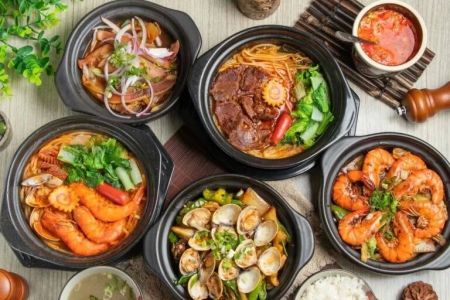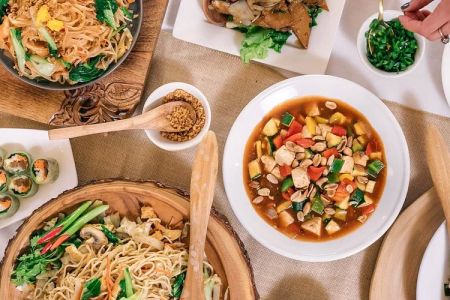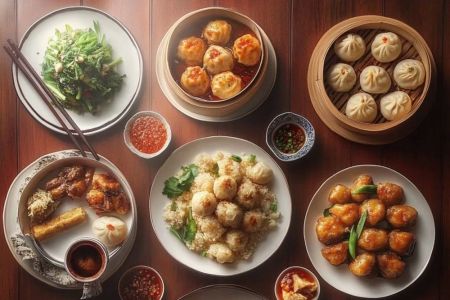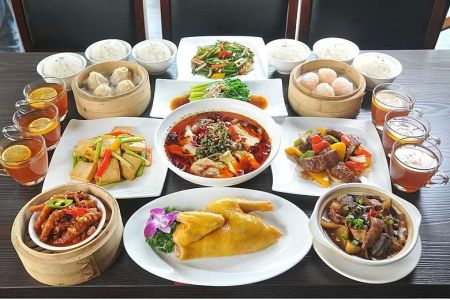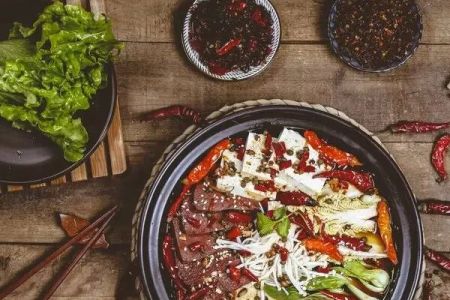The Secret to Steamed Rice Like Chinese Restaurants
Every time I dine at my favorite Chinese restaurant, there’s one thing I always look forward to: the fluffy, perfectly cooked steamed rice that comes with nearly every dish. It’s simple, yet so essential to completing the meal. But how do they do it? The rice is never too dry, too wet, or overcooked. It has just the right texture, and I’ve always wondered how I can recreate this at home. After trying several methods, I’ve finally perfected a technique to make steamed rice just like the Chinese restaurants do – and I’m excited to share it with you!
1. Choosing the Right Rice for Steaming
First things first, the type of rice you use is crucial. Chinese restaurants typically use long-grain white rice, like Jasmine or even Basmati, as it yields the fluffiest, most fragrant results. I tried using regular white rice at home, but the texture was nowhere near as light and airy as the rice from my favorite restaurant. So, I made the switch to Jasmine rice, and it was a game-changer. Jasmine rice has a delicate aroma and a slightly sticky texture that’s perfect for steaming.
2. The Importance of Rinsing the Rice
This step is essential. If you want your rice to come out fluffy, rinsing it is a must. The excess starch on the surface of the rice can cause the grains to clump together, resulting in mushy rice. I was guilty of skipping this step early on, thinking it wasn’t necessary. But once I started rinsing my rice thoroughly under cold water until the water ran clear, the difference was night and day. The rice became perfectly separated, and the texture was just like the rice I get at the restaurant.
3. The Perfect Water-to-Rice Ratio
One of the most important aspects of cooking rice is getting the water-to-rice ratio right. For Jasmine rice, I’ve found that a 1:1.25 ratio of rice to water works best. This means for every cup of rice, you should add 1.25 cups of water. If you add too much water, the rice will become soggy and clumpy; too little water, and the rice will be undercooked and dry. This ratio is ideal for fluffy rice that’s neither too dry nor too sticky. Over the years, I’ve tried different ratios, but this one is by far the most consistent.
Cooking Methods: The Key to Restaurant-Style Steamed Rice
Now that we’ve got the basics down, let’s talk about how to cook the rice. In Chinese restaurants, rice is often steamed rather than boiled. Steaming rice helps it cook evenly and results in a soft, tender texture. While I don’t have a commercial steamer at home, I’ve figured out a way to get the same results with just a regular pot and a lid.
1. Steaming with a Rice Cooker
If you have a rice cooker, you’re in luck – this is the easiest and most foolproof way to cook rice like Chinese restaurants do. I use my rice cooker all the time for making steamed rice. After rinsing the rice and adding the correct amount of water, I simply press the cook button, and the rice cooker does the rest. The beauty of a rice cooker is that it cooks the rice evenly and automatically adjusts the cooking time. Once the rice is done, it will stay warm without overcooking or drying out.
2. Steaming Without a Rice Cooker
If you don’t have a rice cooker, don’t worry – you can still achieve restaurant-quality rice using a regular pot. Here’s how I do it: after rinsing the rice and adding water, I bring it to a boil over medium heat. Once it starts boiling, I reduce the heat to low, cover the pot with a tight-fitting lid, and let it simmer for about 18 minutes. I don’t lift the lid during the cooking process because it’s crucial to keep the steam trapped inside. Once the rice is cooked, I turn off the heat and let it sit for 5-10 minutes before fluffing it with a fork. This helps the rice finish cooking in its own steam and results in fluffy rice every time.
3. Using a Bamboo Steamer
If you’re looking for an authentic touch, you can try steaming your rice in a bamboo steamer. This method is often used in Chinese restaurants, and it imparts a unique texture and flavor to the rice. To use a bamboo steamer, you’ll need to first soak the rice for about 30 minutes. After that, place the soaked rice in a heatproof dish, then set the dish inside the bamboo steamer. Steam the rice for about 30 minutes, checking occasionally to ensure it’s cooking evenly. The result is incredibly fluffy rice with a slightly chewy texture that’s characteristic of the rice served in many Chinese restaurants.
Adding Flavor and Fragrance to Your Steamed Rice
Chinese restaurants often serve steamed rice as a simple side dish, but sometimes they add a little extra flavor. If you want to elevate your rice and make it even more delicious, here are a few tricks I’ve learned along the way:
1. Adding Aromatics
One way to make your rice more fragrant is by adding a few aromatics during the cooking process. I like to add a couple of pandan leaves or a cinnamon stick to the pot while the rice is cooking. These ingredients infuse the rice with a subtle fragrance that reminds me of the rice served in Chinese restaurants. Just be sure to remove the pandan leaves or cinnamon stick before serving.
2. Using Chicken or Vegetable Broth
If you want to add a savory depth of flavor to your rice, try cooking it in chicken or vegetable broth instead of water. I’ve found that this gives the rice an added richness that pairs perfectly with stir-fries or other Chinese dishes. You can also add a small splash of soy sauce or sesame oil to the water for an extra layer of flavor.
3. Infusing with Ginger and Garlic
For a more robust flavor, you can infuse your rice with ginger and garlic. I usually sauté a few slices of ginger and a couple of minced garlic cloves in a little oil before adding the rice and water. The ginger and garlic provide a warm, aromatic flavor that adds depth to the rice. This method is perfect if you're serving the rice with dishes that have strong flavors, like stir-fried vegetables or spicy meat dishes.
My Journey to Perfecting Steamed Rice
I’ll never forget the first time I tried to make steamed rice at home. I followed a basic recipe, and it was an absolute disaster. The rice came out sticky and clumpy, completely unlike the fluffy, fragrant rice I enjoyed at Chinese restaurants. I knew there had to be a better way. After a lot of trial and error, I started to understand the importance of rinsing the rice, getting the water-to-rice ratio right, and using the right cooking method. With a few simple tricks and a little patience, I was able to achieve perfect, restaurant-quality steamed rice every time.
Over the years, I’ve perfected my technique and found ways to customize the rice to suit my tastes. Whether you’re cooking for yourself or a group of friends, mastering steamed rice is a great way to enhance any meal. With these tips, you’ll be able to make rice that’s as fluffy and fragrant as the rice served in your favorite Chinese restaurants – all from the comfort of your own kitchen.



